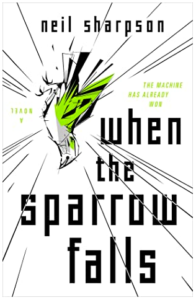This brilliant novel is as if you took the best parts of Blade Runner and Gorky Park and Vertigo and mashed them all together with the most tender empathy and an eye to not only singularity but also the meaning of godhood. My only complaint with this book is that I’d freaking love it if the showdown between Natasha and Sally had been expanded into an entire book of its own instead of being limited to a chapter and a half. I do hope Neil Sharpson considers doing that: even tho readers of this book will know how it ends, I think it would still be an utterly fascinating read, especially if it’s written with the same verve and heart as this book was.
 When The Sparrow Falls is the story of State Security Agent Nikolai South, a man whose career and involvement in Party politics has been so perfunctory as to be almost suspicious in a country where ambition and paranoia are the norm. South lives in the Caspian Republic, the last bastion of unadulterated humanity, free of the corrupting influence of Artificial Intelligence. AI not only advises the rest of the world’s governments but also offers people an extension on their lifespans, allowing their personalities to be uploaded from their dying bodies into dataspace, then downloaded from dataspace into clone bodies. The Caspian Republic was formed on a revulsion at the idea of this, but the passing decades have moved it from an enclave of dreamers and philosophers (who casually ignore the genocide that allowed them to set up their nation) to a police state whose people are afraid to speak aloud their hopes and dreams.
When The Sparrow Falls is the story of State Security Agent Nikolai South, a man whose career and involvement in Party politics has been so perfunctory as to be almost suspicious in a country where ambition and paranoia are the norm. South lives in the Caspian Republic, the last bastion of unadulterated humanity, free of the corrupting influence of Artificial Intelligence. AI not only advises the rest of the world’s governments but also offers people an extension on their lifespans, allowing their personalities to be uploaded from their dying bodies into dataspace, then downloaded from dataspace into clone bodies. The Caspian Republic was formed on a revulsion at the idea of this, but the passing decades have moved it from an enclave of dreamers and philosophers (who casually ignore the genocide that allowed them to set up their nation) to a police state whose people are afraid to speak aloud their hopes and dreams.
When South is summoned to meet the acting head of State Security, he immediately fears that one of his indiscretions — warning a witness to hide before the thugs of Party Security can find him, not reporting graffiti or other petty crimes, being a less than enthusiastic Party member — is going to cost him his freedom, if not his life. Instead, Deputy Director Augusta Niemann has a job for him. The recent death of firebrand journalist Paulo Xirao was shocking less for how it happened than for the revelation that Xirao, whose stock in trade was unimaginative if fervent polemics against technology, was actually an AI himself, with registered citizenships in both America and Europe. His widow Lily wants to fly into the Caspian Republic to identify him. Feeling pressure from the outside world, Niemann is inclined to allow it.
Ofc, Lily will need a babysitter, which is where South comes in. The last thing South expects, however, is for Lily to bear an uncanny resemblance to his late wife Olesya. Soon, South is plunged into a disorienting game of trying to protect Lily from people hostile to any AI setting foot in Caspian Territory, while striving to uphold the ideals of a Republic he still believes in, even if the reality has proven bitterly disappointing.
I rather expected to enjoy the heady ideas and fast-paced thrills and dark humor of this exploration of both AI and authoritarianism, but I did not expect to be crying my eyes out at the end, especially at old Niko’s advice for Lily’s stories. The amount of love for humanity is overwhelming in the best possible way, as Mr Sharpson considers not only the technological possibilities available to us but also the ways in which we need to remember what truly matters. And, oh boy, is this one of the most politically astute novels I’ve read in, perhaps, ever! Mr Sharpson ably dissects the claims for and counterclaims against a nation founded on what’s essentially a principle of exclusion, while subtly critiquing real world atrocities throughout history. For being a science fiction novel, it also features one of the best fictional portraits of a politician who is hero and villain both. That this wildly intelligent sci-fi thriller is, on top of everything else, a debut novel is a truly impressive feat.
I am 100% nominating this for next year’s Hugos.
When The Sparrow Falls by Neil Sharpson was published today June 29 2021 by tordotcom and is available from all good booksellers, including
